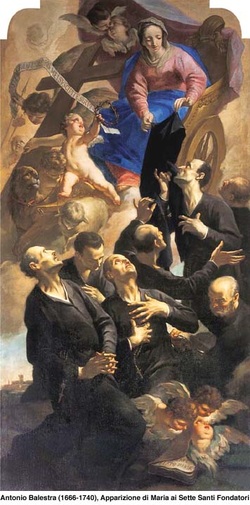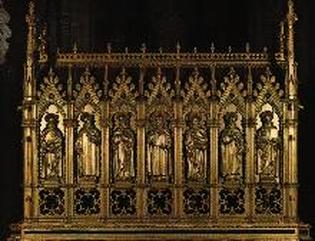
God shewed by a miracle how acceptable in his sight should be their manner of life, for a short while after, when these seven men were begging alms from door to door through the city of Florence, it came to pass that some children, among whom was holy Philip Beniti, who had then scarcely entered the fifth month of his age, called them blessed Mary's servants, by the which name they were called ever after. To avoid meeting people, and in the desire to be alone, they all withdrew together to the solitude of Monte Senario, and there began a kind of heavenly life. They lived in caves and upon herbs and water only, while they wore out their bodies with watching and other hardships, while they contemplated unweariedly the sufferings of Christ and the woes of his most sorrowful Mother. One Good Friday, when their thoughts were fixed thereon more than ever, the Blessed Virgin appeared to them twice, and shewed them her garments of mourning as those wherein they should clothe themselves. She bade them know that she would take it right well that they should raise up in the Church a new order to recall the memory of the sorrows which she bore beneath the Cross of the Lord. Holy Peter, the illustrious martyr of the Order of Friars Preachers, learnt this not only from his familiar converse with these holy men, but also from a special vision of the Mother of God, and it was on his incitement that they founded the regular Order called that of the Servites, or Servants of the Blessed Virgin, the which Order was afterward approved by the Supreme Pontiff Innocent IV.
These holy men, when they had gathered to themselves some companions, began to go through the cities and towns of Italy, and especially of Tuscany, everywhere preaching Christ crucified, stilling contests among the citizens, and calling back almost countless backsliders into the path of grace. Neither did they make Italy only the field of their Gospel labours, but also France, Germany, and Poland. They passed away to be ever with the Lord when they had spread far and wide a sweet savour of Christ, and were famous also for the glory of signs and wonders. As one love of brotherhood and of the monastic life had joined them together upon earth, so one grave held their dead bodies, and one honour was paid them by the people. For this reason the Supreme Pontiffs Clement XI and Benedict XIII confirmed the honour which had for centuries been paid to them individually, and Leo XIII, after proof of their miracles which had been wrought by God on the common invocation of these saints, after their veneration had been sanctioned in the jubilee year of his priesthood, decreed to them the honours paid to Saints, and ordered that their memory should every year be kept throughout the universal Church with an Office and Mass.





